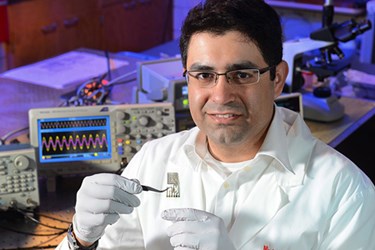Will Dissolvable Electronics Revolutionize Implantable Device Design?
By Joel Lindsey

Researchers at Iowa State University recently reported success in using a particular type of degradable polymer as the platform for dissolvable electronics, a development that could significantly impact the design of dissolvable electronic medical devices in the future.
“Investigation of electronic devices based on transient materials (transient electronics) is a new and rarely addressed technology with paramount potentials in both medical and military applications,” the research team wrote in a paper published recently in the journal Advanced Functional Materials. “Controlled degradation and transiency of materials is of significant importance in the design and fabrication of degradable and transient biomedical and electronic devices and platforms.”
In order to achieve more controlled degradation, the research team used a film of polyvinyl alcohol (PVA), a water soluble synthetic polymer, as the platform for small dissolvable electronic devices.
By applying gelatin or sucrose to the PVA, scientists were able to control the speed at which the material dissolved.
“The composite structure can be used as a means to control the dissolution and transiency rate of the polymer composite film,” the group wrote. “Experimental and computational studies demonstrate that the addition of gelatin or sucrose to a PVA polymer matrix can be used as a means to program and either slow or enhance the transiency of the composite.”
According to a news release published by Iowa State University, the ability to control the rate of dissolution of the PVA platform may allow device manufacturers to create dissolvable electronic devices that could be controlled and triggered remotely.
The idea of transient electronics continues to interest researchers and developers working in the medical field. Using the technology, electronic medical devices could be designed to dissolve in the body when no longer needed.
“While many of these [electronic medical devices] have revolutionized modern medicine, they oftentimes outlive their purpose in the body and require surgical removal to avoid complication,” medical industry columnist Loren Grush wrote in a column published earlier this year by Fox News. “But rather than remove these devices through surgery, what if they could simply disappear?”
Citing John Rogers, a professor of materials science and engineering at the University of Illinois at Urbana-Champaign who focuses on developing dissolvable electronics for medical applications, Grush reported that many experts hope to see these types of devices available for use in the coming years.
“While transient electronics still have to undergo the long, standard regulatory process,” she wrote, “Rogers is hopeful that his technology will be available for clinical use within the next decade.”
Image Credit: Bob Elbert
